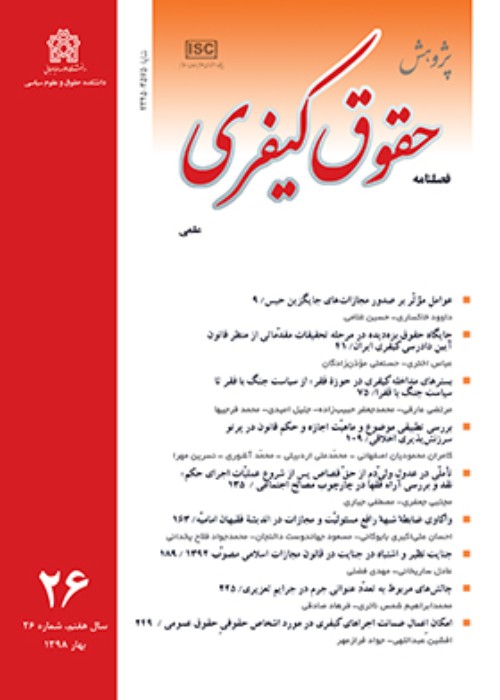The nature of third party payment of the difference in the Diyeh (blood money) and its effects
In cases where the blood money for the killer exceeds that of the victim, and the avengers of blood demand Qisas (retaliation), attaining the right of Qisas requires restitution of the difference in Diyeh to the person being avenged. The responsibility for paying the difference in Diyeh varies depending on the circumstances. It can be the responsibility of the owner of the right of retribution (the victim or the avengers of blood), the person or persons who are not avenged against, or the avenge (one administering retaliation) and their accomplice(s). However, if the issue of complicity in an intentional crime is not raised, the payment of Diyeh is solely the responsibility of the owner of the right of retribution. For example, when a man knowingly and intentionally kills a woman, the avengers of blood must pay him half of the killer's Diyeh.Despite the jurisprudential background and legislative history of Diyeh, the Iranian legislator has not stated its specific provisions in an independent chapter in the new Islamic criminal code approved in 2013, instead allocating various provisions to scattered sections. As a result, new issues in the judicial procedure face unresolved challenges due to the lack of a definitive text. One objective and factual issue that arises in a criminal case is when a third party (not the avenger of blood), without the permission of the avengers of blood, pays the difference in the killer's Diyeh during the execution of criminal sentences in the judicial fund. In such cases, questions arise regarding the approach to be adopted and the nature of this legal action. According to Article 427 of the Islamic Penal Code approved in 2013, the nature of the payment of Diyeh by the avengers of blood is to compensate for the damage caused, create balance and equality between the killer and the victim, and it is an imperative rule, not a condition for the emergence of the right to retribution (not a favorable rule). For this reason, as soon as the crime occurs, the avenger of blood has the right to retaliation, but the retaliation depends on the payment of the difference in Diyeh. If the right of retribution were based on the payment of the difference, and the guardian retaliated without paying, he would also be retaliated against. However, according to the rule of 427, he commits ta'zeer. Legislators have remained silent about the nature of payment of the difference by a third party in the Islamic criminal Code, leading to challenges and fundamental differences of opinion among lawyers and within the judicial procedure of criminal courts. One of these challenges is whether, by paying the difference in Diyeh through a third party, there is a possibility of retaliation for the avengers of blood. Additionally, once Diyeh is paid, does the third party become a stranger without rights to it? Do the rules of debt apply, or can a third party or the avengers of blood go directly to the criminal enforcement unit for reimbursement? Does the difference in Diyeh become the property of the killer or their heirs, allowing any interference, or is it solely for the fulfillment of the killer's retaliation, refundable by the third party before the retaliation? The answer to all these challenges depends on explaining the nature and examining the legal effects of this act, specifically the third-party payment of the difference in Diyeh. The importance of this matter goes beyond the presentation of a legal theory, and adhering to one of the proposed views on the nature of the third-party payment of the difference in Diyeh can ultimately determine whether the killer faces retaliation or is released from it until another time.The present research, which is novel in its kind, after explaining the basic concepts of the research, separates the nature of the Diyeh from the difference in the Diyeh and then examines the nature of the difference in the Diyeh paid by the third party from the perspective of jurists and judicial procedure and while criticizing the views of the opponents, tries to present a theory in accordance with the foundations of Islamic jurisprudence and law and their principles and rules.
- حق عضویت دریافتی صرف حمایت از نشریات عضو و نگهداری، تکمیل و توسعه مگیران میشود.
- پرداخت حق اشتراک و دانلود مقالات اجازه بازنشر آن در سایر رسانههای چاپی و دیجیتال را به کاربر نمیدهد.


